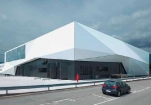ICRC : Neutrality and Impartiality

Designing the logitics center of the International Committee of the Red Cross (ICRC ) in Geneva, the architects of group8 were motivated primarily by the principle of neutrality, which is guided in its activity this humanitarian organization. Philosophical concept of neutrality set out in the work of Roland Barthes, French philosopher- poststructuralist and semiotics. He explicitly defines “neutral” as that avoids paradigm destroying irreconcilable differences between two specified positions.
The International Committee of the Red Cross (ICRC) is a humanitarian organization, which operates around the world, based on the principles of neutrality and impartiality. It provides protection and assistance to victims of armed conflict and internal violence. Principles guiding the ICRC lie in the fact that even the war should be waged within a certain framework, which impose limitations on the methods and means of warfare and behavior of the warring parties. The vault based on this principle of the rules of international humanitarian law, at the heart of which lays the Geneva Convention is signed by all the nations of the world, making it the most versatile of all the international agreements. The ICRC is not an international or intergovernmental organization in the legal sense, but its international status and the mandate provides it the privileges and immunities comparable to the UN. These conditions include exemption from taxes and customs duties, security of premises and documents and immunity from legal proceedings.
The ICRC logistic complex in Geneva is dedicated to pharmaceuticals’ and medicine’s storing, as well as orthopaedic devices and food. These materials will be shipped to the ICRC’s delegates positioned around the world, in order to help endangered populations in humanitarian crisis’ zones. Directly linked to the logistic complex, offices and meeting rooms form a key location from which humanitarian missions and material transportation are led.
The facade surrounds the suspended gardens, form cocoon like areas isolated from the surrounding industrial buildings, offering a warm and friendly working environment to the users.
Together with the fieldwork ran by the ICRC, the archives conserve a trace of all the delegation’s activities. These unique and irreplaceable documents need to be conserved for a very long period of time. In order to preserve these documents, the archive rooms were built following strict standards of construction, in terms of space, operating and climate controlling.
Full version you can download here
 Materials provided by group8 Photos: © Régis Golay ,Federal studio, Geneva
Materials provided by group8 Photos: © Régis Golay ,Federal studio, Geneva


